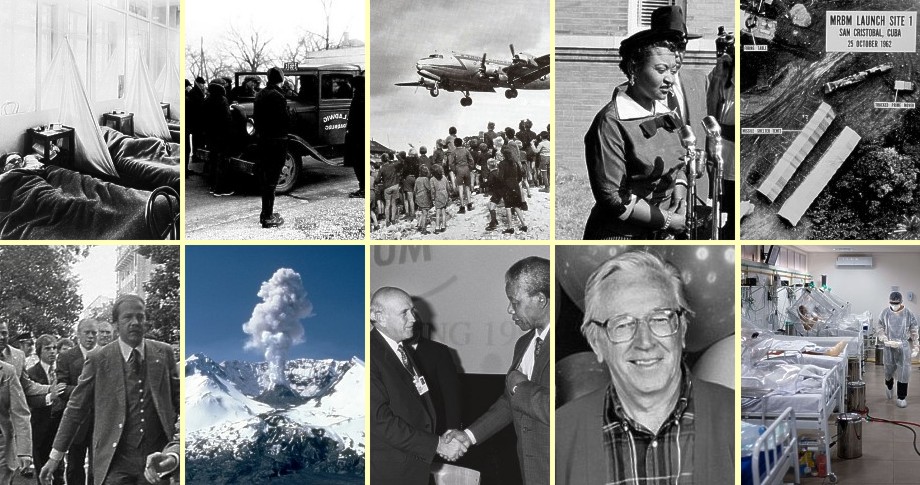Kansas Snapshots by Gloria Freeland - September 18, 2020
A question
Husband Art asked me a question the other day that I'm having trouble answering. I wondered how my readers might answer.
In 1920, women earned the right to vote just as the 1918 influenza pandemic ended. During that decade, the automobile was the
"new" thing and everyone thought they "needed" one. The industrialization that produced the car also meant a single farmer could
handle far more land than before. The resulting overpopulation in rural areas forced thousands off farms into the factories of the
cities, wiping out small town after small town.
But youngsters embraced cities, where jazz, silent films and store-bought fashionable clothes were in great supply. Prohibition
began, producing a situation where gangsters flourished. Young women "bobbed" their hair and went on dates un-chaperoned in cars.
Cities were seen as both exciting and "dens of inequity."
The 1930s opened with the 1929 stock market crash biting hard and millions losing their jobs. Cities experienced 30 percent
unemployment, while the Midwest saw years of record-high temperatures, strong winds and drought, ushering in the Dust Bowl.
Hundreds of thousands were forced to leave their farms looking for work.
Franklin Roosevelt began four terms as President - a feat never again matched. Hitler came to power in Germany, turning a democracy
into a dictatorship. He started the European theater of World War II, while dictator Franco was in charge in Spain and Mussolini
strutted in Italy.
By the 1940s, Japan was subjugating China, the Philippines and much of the Pacific. In late 1941, the United States entered the fray,
backing the Allied nations. The war ended mid-decade after we had lost 400,000 men. But our losses didn't compare to the 15 million
deaths of the Soviet Union. By the end of the decade, the Soviets were our enemy and the communists took over in China.
The 1950s opened with the start of the Korean War, as China and the Soviet Union flexed their muscles. Americans, fearful of an
atomic war, built fall-out shelters. In school, children practiced duck-and-cover drills, more to placate parental fears than
realistically protect their children. Sen. Joe McCarthy and the House Un-American Activities Committee ruined lives by baselessly
accusing people of being communists. The polio vaccine led to nationwide immunization, stopping the periodic outbreaks. The decade
ended with our being twice humbled by the Soviet Union - first when they shot down an American spy plane, followed by launching the
first manmade satellite into earth orbit.
But people "escaped" by spending their free time watching a new thing called television. Everyone needed one, whether they needed
one or not.
President Dwight Eisenhower had ended the Korean War, but laid the groundwork for the Vietnam War, which would dominate the nation's
attention alongside the Civil Rights movement for much of the 1960s. Cities were ablaze across the country. Four leaders - President
John F. Kennedy, his brother Robert, Malcolm X and Martin Luther King, Jr. - were assassinated.
At the start of the 1970s, President Richard Nixon steered the country toward exiting the Vietnam War and another U.S. black eye,
while interest rates flirted with 20 percent, threatening the economy. His second term began with impeachment hearings and his
eventual resignation.
The end of the decade saw Georgia peanut farmer Jimmy Carter mediate an Israeli-Egypt peace agreement, but the fall of the
U.S.-backed dictator in Iran led to the return of Ayatollah Khomeini and the siege of the American Embassy in Tehran.
Ronald Reagan's presidency began in 1980 and the 444-day hostage situation in Iran ended. But a year later, the president was shot.
Then the AIDs pandemic caught media attention. Reagan�s "Star Wars" program and the Soviet Chernobyl nuclear disaster applied
crushing pressure on the Soviet Union, leading to its collapse. Leader Mikhail Gorbachev became an American celebrity as the Iron
Curtain rusted away and the two Germanies became one. Democracy was breaking out all over Europe as amazed Americans watched it
unfold on TV.
But jubilation was dashed when Saddam Hussein invaded Kuwait in 1990, precipitating the first Gulf War. This time, the outcome was
better than the U.S.'s last major military adventure, yet the 1992 election saw George H.W. Bush rejected in favor of a
saxophone-playing Arkansan, who had a womanizing problem - a problem that filled the airwaves. His impeachment was followed by
discussions of all manner of sexual matters never before heard in prime time. Still, under his presidency, the Kosovo War in the
Balkans came to an end.
The 2000s opened with a presidential election dependent on "hanging chads" and an outcome that contradicted the popular vote. George
W. Bush hardly had time to enjoy his win when a scheme conjured by Osama bin Laden sent planes into New York's Twin Towers and the
Pentagon. Another plane aimed at Washington, D.C. crashed when passengers intervened. America's anger was directed at Saddam Hussein,
incorrectly thought to be behind the attack. Gulf War II began with a quick military victory, but its political outcome is still in
doubt.
At the end of the second Bush's presidency, shady dealings in the financial market led to a housing mortgage collapse, wiping out
many financial institutions and sending many ordinary Americans ready for retirement back into the workplace.
As the decade closed, America elected its first president of color. A pitched political battle quickly followed over the national
health care system, the ripples from which are still playing out.
As President Barack Obama's time in office waned, political pundits anointed his Secretary of State as his successor, but a funny
thing happened when people went to the polls. Americans by large numbers proved the pundits right, but the Electoral College follows
a different logic, crowning Hillary Clinton's opponent the winner.
So what was that question Art posed that I'm having trouble answering? He said he hears these are unusual times. His question?
"Which of those past 100 years were the usual ones?"
